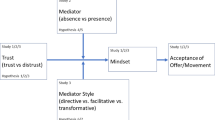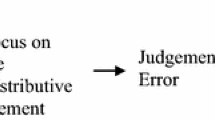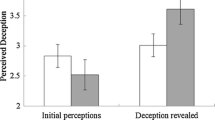Abstract
The authors examined whether negotiators are prone to an “illusion of transparency,” or the belief that their private thoughts and feelings are more discernible to their negotiation partners than they actually are. In Study One, negotiators who were trying to conceal their preferences thought that their preferences had “leaked out” more than they actually did. In Study Two, experienced negotiators who were trying to convey information about some of their preferences overestimated their partners' ability to discern them. The results of Study Three rule out the possibility that the findings are simply the result of the curse of knowledge, or the projection of one's own knowledge onto others. Discussion explores how the illusion of transparency might impede negotiators' success.
Similar content being viewed by others
References
Barr, C. L. and R. E. Kleck. 1995. Self-other perception of the intensity of facial expressions of emotion: Do we know what we show? Journal of Personality and Social Psychology 68: 608-618.
Bazerman, M. H. and M. Neale. 1992. Negotiating rationality. New York: Free Press.
Camerer, C., G. Loewenstein, and M. Weber. 1989. The curse of knowledge in economic settings: An experimental analysis. Journal of Political Economy 97: 1232-1253.
Epley, N. and T. Gilovich. 2001. Putting adjustment back in the anchoring and adjustment heuristic: An examination of self-generated and experimenter-provided anchors. Psychological Science 12: 391-396.
Gilovich, T. D., K. K. Savitsky, and V. H. Medvec. 1998. The illusion of transparency: Biased assessments of others' ability to read our emotional states. Journal of Personality and Social Psychology 75: 332-346.
Gordon, R. A. and P. J. Vicarii. 1992. Eminence in social psychology: A comparison of textbook citation, social science citation index, and research productivity rankings. Personality and Social Psychology Bulletin 18: 26-38.
Keysar, B. and B. Bly. 1995. Intuitions about the transparency of intention: Linguistic perspective taking in text. Cognitive Psychology 26: 165-208.
Keysar, B., L.E. Ginzel, and M. H. Bazerman. 1995. States of affairs and states of mind: The effect of knowledge on beliefs. Organizational Behavior and Human Decision Processes 64: 283-293.
Raiffa, H. 1982. The art and science of negotiation . Cambridge, Mass.: Harvard University Press.
Savitsky, K. 1997. Perceived transparency of and the leakage of emotional states: Do we know how little we show? Unpublished doctoral dissertation, Cornell University.
Thompson, L. 1990. An examination of naïve and experienced negotiators. Journal of Personality and Social Psychology 26: 528-544.
— 1991. Information exchange in negotiation. Journal of Experimental Social Psychology 27: 161-179.
Tversky, A. and D. Kahneman. 1974. Judgment under uncertainty: Heuristics and biases. Science 185: 1124-1131.
Vorauer, J. D. and S. Claude. 1998. Perceived versus actual transparency of goals in negotiation. Personality and Social Psychology Bulletin 24: 371-385.
Author information
Authors and Affiliations
About this article
Cite this article
Van Boven, L., Gilovich, T. & Medvec, V.H. The Illusion of Transparency in Negotiations. Negotiation Journal 19, 117–131 (2003). https://doi.org/10.1023/A:1023693700484
Issue Date:
DOI: https://doi.org/10.1023/A:1023693700484




